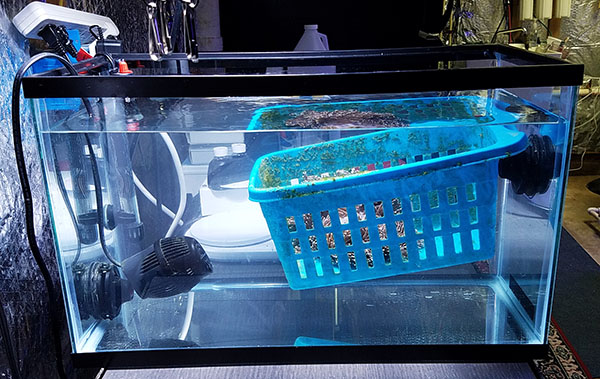 Recently I had an urge to get back into keeping anemones and planned on setting up an anemone-specific aquarium with the 90-gallon tank I resealed. I knew I wanted to start looking at what has been out in the market recently and understand in what state of health they have been received at the local fish stores. Based on the symptoms I saw—gaping mouths, deflated bodies, and some that looked okay but experienced inflate/deflate cycles—I researched what is needed to save these beautiful creatures and give them a fighting chance. Anemones in general are typically poor shippers, so it’s prudent to do our best to care for them as soon as possible. I stumbled upon an awesome old thread on one of the popular forums from 2014 by Minh (OrionN), which outlined his “Protocol for using antibiotics to treat infected anemones.” Working with other anemone enthusiasts, he documented a treatment method that utilizes one of the commonly available antibiotics named Ciprofloxacin (Cipro). Two other alternatives were mentioned, but I will focus on Cipro.
Recently I had an urge to get back into keeping anemones and planned on setting up an anemone-specific aquarium with the 90-gallon tank I resealed. I knew I wanted to start looking at what has been out in the market recently and understand in what state of health they have been received at the local fish stores. Based on the symptoms I saw—gaping mouths, deflated bodies, and some that looked okay but experienced inflate/deflate cycles—I researched what is needed to save these beautiful creatures and give them a fighting chance. Anemones in general are typically poor shippers, so it’s prudent to do our best to care for them as soon as possible. I stumbled upon an awesome old thread on one of the popular forums from 2014 by Minh (OrionN), which outlined his “Protocol for using antibiotics to treat infected anemones.” Working with other anemone enthusiasts, he documented a treatment method that utilizes one of the commonly available antibiotics named Ciprofloxacin (Cipro). Two other alternatives were mentioned, but I will focus on Cipro.
Figure 1: Basic Hospital Tank Setup
Materials needed: 10-gallon tank, Small powerhead, 50w heater, Plastic basket from the dollar store (I personalized this since it made it easier to transport the specimen in and out of the tank.) Small plastic container sized to hold the anemone basket temporarily with water, High-output, full-spectrum lighting (I used my old metal halide fixture.) Ciprofloxacin tablets (Comes in 250 mg or 500 mg tablets and ordered online.) Basket secured by an old Hydor Koralia magnet mount. MORE










0 Comments